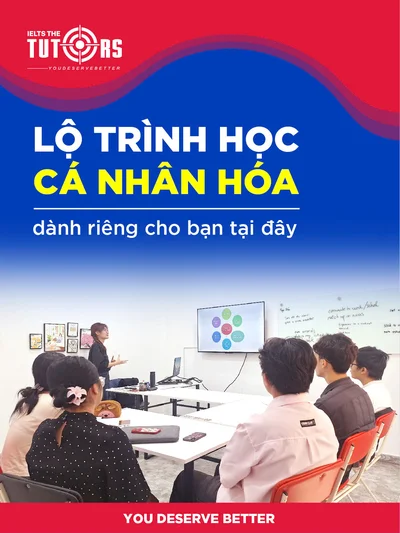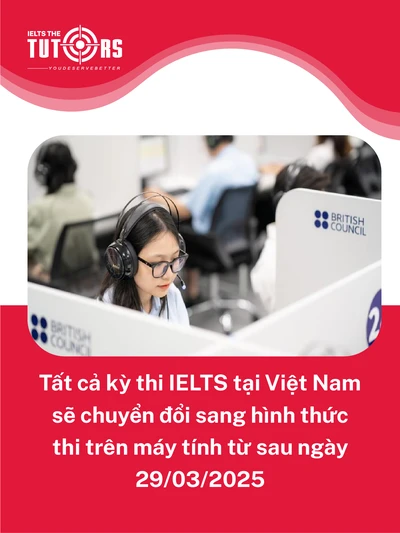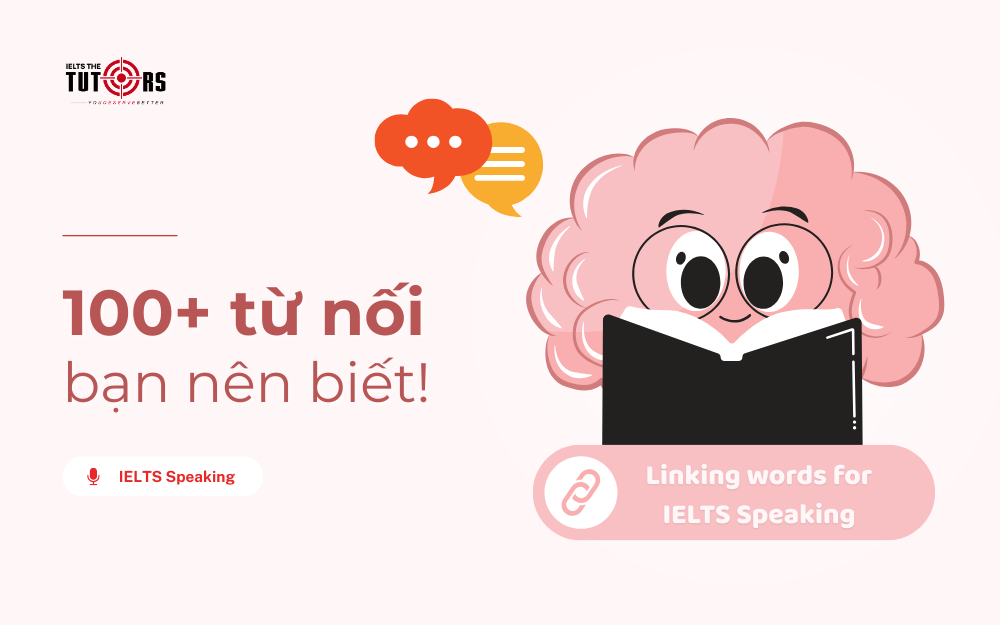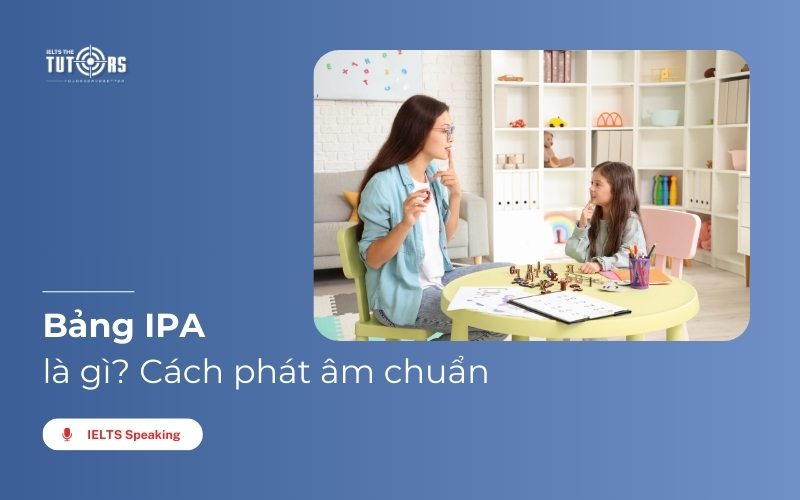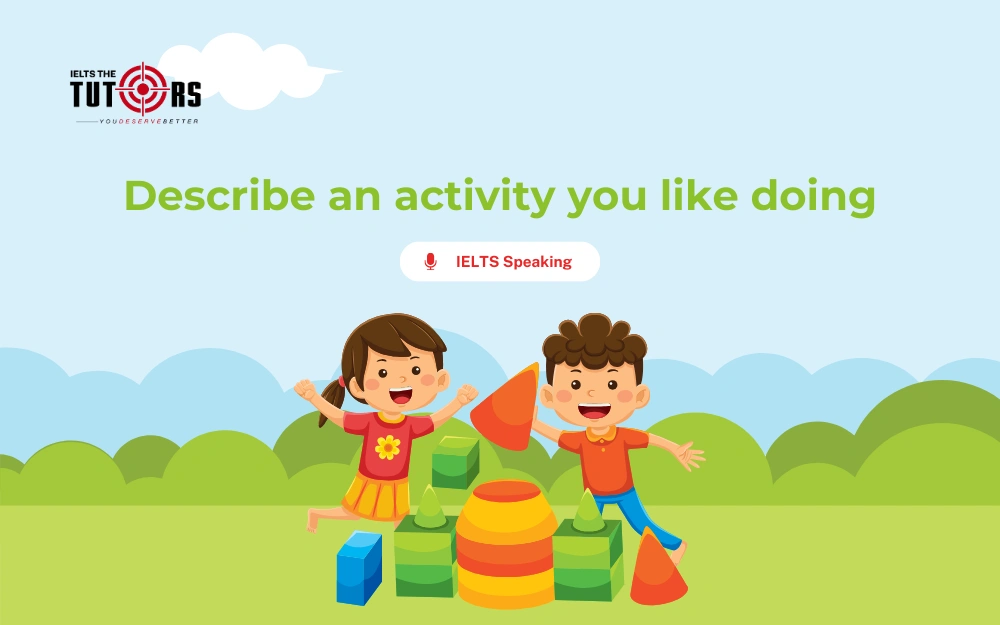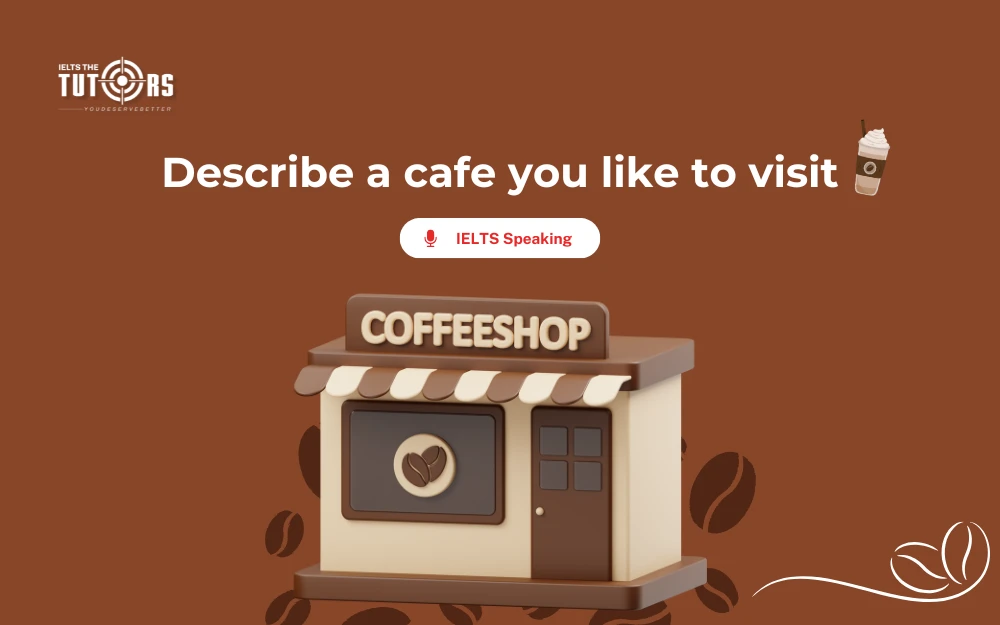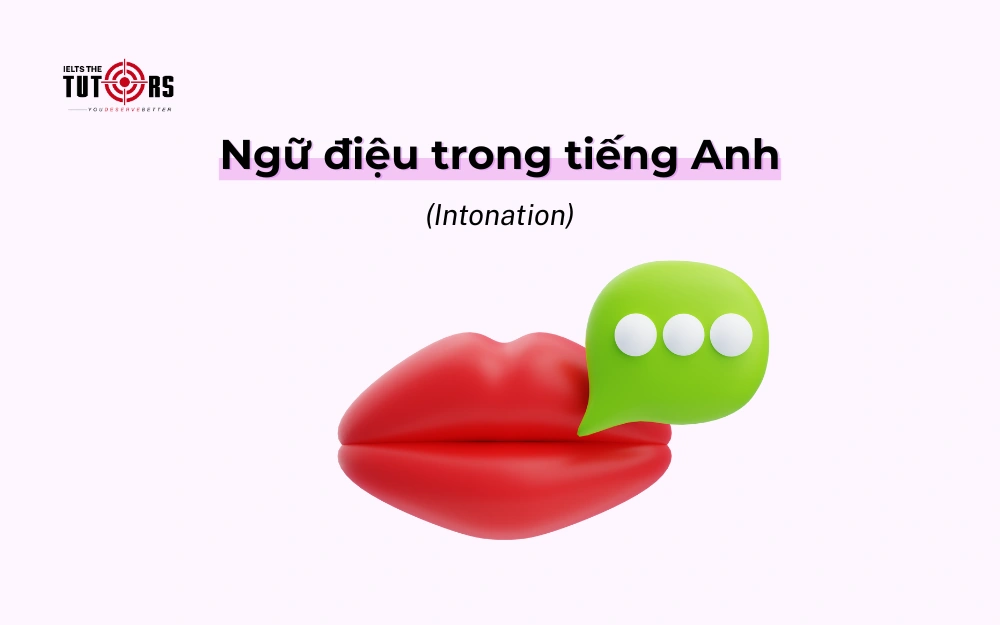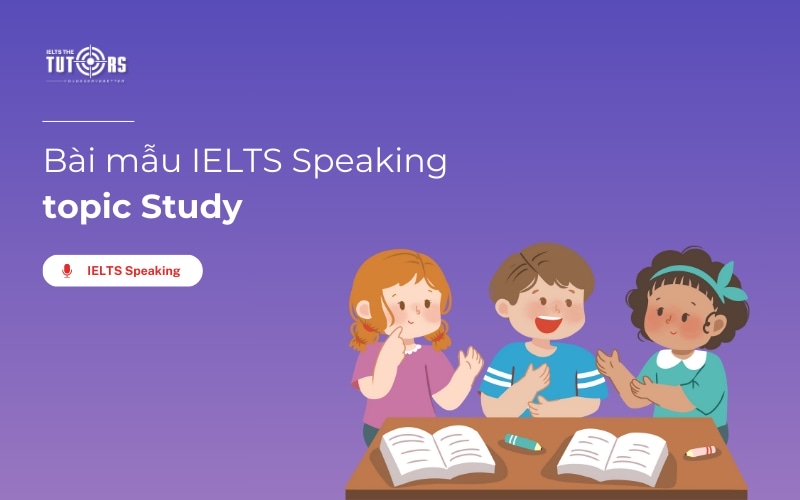
Phần thi IELTS Speaking topic study là một trong những chủ đề vô cùng quen thuộc với các câu hỏi mở đầu như “Do you work or study?”, “What subjects are you studying?” cùng những câu hỏi khác liên quan đến công việc và học tập. Cùng IELTS The Tutors khám phá chủ đề Study qua cách triển khai ý tưởng và vốn từ vựng ăn điểm trong bài viết này nhé!
| Key takeaways |
Part 1
Part 2
Part 3
Từ vựng Curriculum, Degree, Lecture, Classroom, Course, Subject, Teacher, Student, Study, Homework, Exam, Research, … |
Bài mẫu IELTS Speaking topic study part 1
Những câu hỏi mở đầu quen thuộc sẽ được giám khảo đặt ra trong Part 1 của IELTS Speaking topic study:
Question 1: Do you work or study?
Currently, I’m a full-time university student majoring in International Business. I’ve always been passionate about understanding global trade and how businesses operate across borders, so this field suits me perfectly.
Vocabulary:
- full-time (adj): toàn thời gian
- university student (n): sinh viên đại học
- major in (v): học chuyên ngành
- International Business (n): Kinh doanh quốc tế
- passionate about (adj): đam mê
- global trade (n): thương mại toàn cầu
- operate across borders (v): hoạt động xuyên biên giới
Question 2: What subjects are you studying?
In my program, I’m studying a range of subjects, including marketing, finance, and business law. Each subject provides a unique perspective on how businesses function and equips me with practical skills for the future.
Vocabulary:
- marketing (n): tiếp thị
- finance (n): tài chính
- business law (n): luật kinh doanh
- unique perspective (n): góc nhìn độc đáo
- equip with (v): trang bị
- practical skills (n): kỹ năng thực tiễn
Question 3: Why did you choose that subject?
I chose International Business because I’ve always been fascinated by the idea of connecting with people from different cultures through trade. Additionally, this field offers excellent career prospects and the opportunity to travel and work globally.
Vocabulary:
- fascinated by (adj): bị cuốn hút bởi
- connecting with (v): kết nối với
- different cultures (n): các nền văn hóa khác nhau
- career prospects (n): triển vọng nghề nghiệp
- opportunity (n): cơ hội
- work globally (v): làm việc trên toàn cầu
Question 4: Do you like your subject?
Yes, I absolutely enjoy my subject. It’s both challenging and rewarding. I particularly like how theoretical concepts are applied to real-world business scenarios, which makes the learning process engaging and practical.
Vocabulary:
- challenging (adj): đầy thử thách
- rewarding (adj): đáng giá, bổ ích
- theoretical concepts (n): các khái niệm lý thuyết
- real-world scenarios (n): tình huống thực tế
- engaging (adj): hấp dẫn
- practical (adj): mang tính thực tiễn
Question 5: Is it a popular subject in your country?
Yes, it’s quite popular, especially among students aiming for careers in multinational companies or entrepreneurship. Given the growing importance of international trade, many universities in my country offer specialized programs in this field.
Vocabulary:
- multinational companies (n): các công ty đa quốc gia
- entrepreneurship (n): tinh thần khởi nghiệp
- international trade (n): thương mại quốc tế
- specialized programs (n): các chương trình chuyên biệt
Question 6: Do you enjoy your studies?
I do enjoy my studies a lot. The coursework is interesting, and I get to work on projects that require critical thinking and creativity. Plus, interacting with classmates from diverse backgrounds adds to the learning experience.
Vocabulary:
- coursework (n): chương trình học
- interesting (adj): thú vị
- critical thinking (n): tư duy phản biện
- creativity (n): sự sáng tạo
- diverse backgrounds (n): các bối cảnh đa dạng
Question 7: Are there any subjects that you find particularly difficult? Why?
Yes, I find finance quite challenging because it involves complex calculations and requires a solid understanding of economic theories. However, I’m trying to improve by dedicating more time to practice and seeking help from my professors.
Vocabulary:
- challenging (adj): khó khăn
- complex calculations (n): các phép tính phức tạp
- economic theories (n): các lý thuyết kinh tế
- dedicate more time (v): dành nhiều thời gian hơn
- seek help (v): tìm kiếm sự giúp đỡ
Question 8: Do you prefer to study in the mornings or in the afternoons?
I prefer studying in the mornings because my mind feels fresh and focused after a good night’s sleep. I find that I’m more productive and can retain information better during this time of the day.
Vocabulary:
- focused (adj): tập trung
- retain information (v): ghi nhớ thông tin
- productive (adj): năng suất
Question 9: What do you like about your study?
What I like most is the practical nature of the coursework. For example, we often work on case studies that simulate real-world business problems, which helps me develop problem-solving skills and gain valuable insights.
Vocabulary:
- practical nature (n): tính thực tiễn
- coursework (n): chương trình học
- case studies (n): các nghiên cứu tình huống
- simulate (v): mô phỏng
- real-world problems (n): các vấn đề thực tế
- problem-solving skills (n): kỹ năng giải quyết vấn đề
- valuable insights (n): những hiểu biết quý giá
Question 10: What’s your routine like in your everyday study? / What’s your daily study routine?
I try to wake up at a decent time in the morning. If I don’t have class, I spend the morning organizing my notes from the day before. I also like going to a café with my friends to go over our study materials. In the evening, I’ll look at my notes in more detail and memorize essential information.
Vocabulary:
- decent time (noun phrase): Thời gian hợp lý, thời gian vừa phải
- organize (v): sắp xếp, tổ chức
- go over (phrasal verb): xem xét lại, kiểm tra lại
- essential information (n): thông tin quan trọng, thiết yếu
Bài mẫu IELTS Speaking topic study part 2
Question: Describe a subject you enjoyed studying in school.
You should say:
- What the subject was
- How the teacher taught this subject
- What you learned from the subject
And explain why you enjoyed it
One subject I thoroughly enjoyed studying at school was Vietnamese Literature. It was one of the core subjects in our curriculum, and it really captured my imagination.
Our teacher, Mr. Tung, was exceptional. He had a unique teaching style that made every lesson engaging and thought-provoking. Instead of just lecturing, he encouraged us to discuss and analyze the themes, characters, and symbols in classic works like The Tale of Kiều. He often used storytelling techniques and role-playing activities to bring the stories to life, which made learning both interactive and memorable.
Through this subject, I not only improved my reading and analytical skills but also developed a deeper understanding of human emotions and societal issues. For instance, I learned how literature reflects cultural and historical contexts, which has helped me become more open-minded and empathetic.
I particularly enjoyed this subject because it gave me a chance to express my thoughts and opinions creatively. Writing essays and interpreting literary works allowed me to explore different perspectives and think critically. Moreover, the lessons were always dynamic, which made them stand out compared to other, more monotonous subjects.
Overall, studying Vietnamese Literature was an enriching experience that sparked my love for reading and writing. To this day, it remains one of the most influential subjects I’ve ever studied.
Vocabulary:
- thoroughly enjoy (phrase): rất thích, cực kỳ thích
- core subject (n): môn học chính
- curriculum (n): chương trình học
- capture my imagination (phrase): khơi gợi trí tưởng tượng của tôi
- exceptional (adj): xuất sắc, đặc biệt
- unique teaching style (n): phong cách giảng dạy độc đáo
- engaging (adj): hấp dẫn, thu hút
- thought-provoking (adj): kích thích suy nghĩ
- analyze the themes (phrase): phân tích các chủ đề
- The Tale of Kiều: Truyện Kiều
- role-playing activities (n): các hoạt động nhập vai
- interactive (adj): mang tính tương tác
- analytical skills (n): kỹ năng phân tích
- human emotions (n): cảm xúc của con người
- societal issues (n): các vấn đề xã hội
- reflects cultural and historical contexts (phrase): phản ánh bối cảnh văn hóa và lịch sử
- open-minded (adj): cởi mở
- empathetic (adj): đồng cảm
- express my thoughts and opinions (phrase): thể hiện suy nghĩ và quan điểm của tôi
- interpret literary works (phrase): diễn giải các tác phẩm văn học
- explore different perspectives (phrase): khám phá các góc nhìn khác nhau
- think critically (phrase): tư duy phản biện
- dynamic lessons (phrase): các bài học sôi động
- monotonous subjects (phrase): các môn học nhàm chán
- enrich experience (phrase): trải nghiệm làm phong phú thêm
- spark my love for (phrase): khơi dậy niềm yêu thích đối với
Xem thêm:
Bài mẫu IELTS Speaking topic study part 3
Question 1: Do you think your country has an effective education system? Why?
I would say my country has a reasonably effective education system, but there is certainly room for improvement. On the positive side, it emphasizes foundational skills like reading, writing, and mathematics, which are crucial for students' long-term development. Additionally, the government has invested in making education more accessible, especially in rural areas. However, the system is still quite exam-oriented, which can put a lot of pressure on students and sometimes stifles creativity. If we could shift toward a more holistic approach that encourages critical thinking and problem-solving, I believe the system would be significantly more effective.
Vocabulary:
- reasonably effective (adj): khá hiệu quả
- foundational skills (n): kỹ năng nền tảng
- long-term development (n): phát triển lâu dài
- exam-oriented (adj): thiên về kiểm tra, chú trọng kỳ thi
- holistic approach (n): cách tiếp cận toàn diện
- critical thinking (n): tư duy phản biện
- problem-solving (n): giải quyết vấn đề
Question 2: How has teaching changed in your country in the last few decades?
Teaching in my country has undergone significant transformations over the past few decades. In the past, it was predominantly teacher-centered, where students were expected to listen passively and memorize information. However, there has been a noticeable shift towards student-centered learning. Modern classrooms now incorporate technology, such as interactive whiteboards and online resources, to enhance the learning experience. Additionally, teachers are increasingly adopting methods that encourage collaboration and critical thinking. That being said, traditional methods are still prevalent in some areas, particularly in less developed regions.
Vocabulary:
- significant transformations (n): sự thay đổi đáng kể
- teacher-centered (adj): thiên về giáo viên
- student-centered learning (n): học tập lấy học sinh làm trung tâm
- interactive whiteboards (n): bảng tương tác
- incorporate technology (v): kết hợp công nghệ
- collaboration (n): sự hợp tác
- critical thinking (n): tư duy phản biện
Question 3: What’s the importance of tertiary education?
Tertiary education plays a pivotal role in personal and societal development. On an individual level, it equips students with advanced knowledge and skills needed to excel in their chosen careers, often leading to better job prospects and higher earning potential. From a broader perspective, tertiary education fosters innovation and research, which are crucial for economic growth and addressing global challenges. For example, many groundbreaking medical and technological advancements stem from universities. Moreover, it promotes cultural exchange and understanding, as students from diverse backgrounds often come together to learn and collaborate.
Vocabulary:
- pivotal role (n): vai trò then chốt
- advanced knowledge and skills (n): kiến thức và kỹ năng nâng cao
- career prospects (n): triển vọng nghề nghiệp
- higher earning potential (n): tiềm năng thu nhập cao hơn
- economic growth (n): tăng trưởng kinh tế
- groundbreaking advancements (phrase): những tiến bộ đột phá
- fosters innovation (phrase): thúc đẩy sự đổi mới
- cultural exchange (n): giao lưu văn hóa
- societal development (n): phát triển xã hội
Question 4: What is the difference between the way children learn and the way adults learn?
Children and adults learn differently due to their cognitive development and life experiences. Children are like sponges; they absorb information quickly, especially when it is presented in a fun and interactive way. They tend to rely more on repetition and structured guidance from teachers. On the other hand, adults are more self-directed learners. They often prefer practical and goal-oriented learning, focusing on skills that are immediately applicable in their lives or careers. Furthermore, adults draw heavily on their prior experiences to make sense of new concepts, while children usually learn without preconceived notions.
Vocabulary:
- self-directed learners (n): người học tự chủ
- practical and goal-oriented learning (adj + n): học tập thực tiễn và hướng đến mục tiêu
- prior experiences (n): kinh nghiệm trước đó
- preconceived notions (n): khái niệm có sẵn
- absorb information quickly (phrase): tiếp thu thông tin nhanh chóng
- structured guidance (adj + n): sự hướng dẫn có cấu trúc
Question 5: How can a teacher make lessons for children more interesting?
To make lessons more engaging for children, teachers need to create a fun and interactive learning environment. Incorporating games, storytelling, and hands-on activities can capture their attention and make complex concepts easier to understand. For instance, using colorful visuals or props in a science class can help explain abstract ideas. Additionally, integrating technology, such as educational apps and videos, can make learning more dynamic. It’s also important for teachers to encourage participation by asking questions and fostering discussions, which helps children feel more involved in the learning process.
Vocabulary:
- interactive learning environment (phrase): môi trường học tập tương tác
- hands-on activities (phrase): các hoạt động thực hành
- visuals or props (n): hình ảnh hoặc đạo cụ
- educational apps and videos (n): ứng dụng và video giáo dục
- encourage participation (phrase): khuyến khích sự tham gia
- foster discussions (phrase): tạo ra các cuộc thảo luận
Từ vựng thông dụng trong IELTS Speaking about study
|
Từ vựng |
Phiên âm |
Loại từ |
Nghĩa tiếng Việt |
|
Curriculum |
/kəˈrɪkjʊləm/ |
noun |
Chương trình học |
|
Degree |
/dɪˈɡriː/ |
noun |
Bằng cấp, trình độ |
|
Lecture |
/ˈlɛktʃər/ |
noun |
Bài giảng |
|
Classroom |
/ˈklɑːsruːm/ |
noun |
Lớp học |
|
Course |
/kɔːs/ |
noun |
Khóa học |
|
Subject |
/ˈsʌbdʒɪkt/ |
noun |
Môn học |
|
Teacher |
/ˈtiːtʃər/ |
noun |
Giáo viên |
|
Student |
/ˈstjuːdənt/ |
noun |
Học sinh, sinh viên |
|
Study |
/ˈstʌdi/ |
verb, noun |
Học tập, nghiên cứu |
|
Homework |
/ˈhoʊmwɜːrk/ |
noun |
Bài tập về nhà |
|
Exam |
/ɪɡˈzæm/ |
noun |
Kỳ thi |
|
Research |
/rɪˈsɜːrtʃ/ |
verb, noun |
Nghiên cứu |
|
Assignment |
/əˈsaɪnmənt/ |
noun |
Nhiệm vụ, bài tập |
|
Project |
/ˈprɒdʒɛkt/ |
noun |
Dự án |
|
Presentation |
/ˌprɛzənˈteɪʃən/ |
noun |
Bài thuyết trình |
|
Tutorial |
/tjuːˈtɔːriəl/ |
noun |
Buổi học kèm, bài giảng hướng dẫn |
|
Grade |
/ɡreɪd/ |
noun |
Điểm số |
|
Scholarship |
/ˈskɒlərʃɪp/ |
noun |
Học bổng |
|
Degree program |
/dɪˈɡriː ˈprəʊɡræm/ |
noun |
Chương trình học cấp độ đại học |
|
Tuition fees |
/tjuːˈɪʃən fiːz/ |
noun |
Học phí |
|
Online learning |
/ˈɒnlaɪn ˈlɜːnɪŋ/ |
noun |
Học trực tuyến |
|
Distance learning |
/ˈdɪstəns ˈlɜːnɪŋ/ |
noun |
Học từ xa |
|
Campus |
/ˈkæmpəs/ |
noun |
Khuôn viên trường |
|
Scholar |
/ˈskɒlər/ |
noun |
Học giả |
|
Classmate |
/ˈklɑːsmeɪt/ |
noun |
Bạn học |
|
Tutor |
/ˈtjuːtər/ |
noun |
Gia sư, người hướng dẫn học |
|
Internship |
/ˈɪntɜːnʃɪp/ |
noun |
Thực tập |
|
Academic |
/ˌækəˈdɛmɪk/ |
adj |
Thuộc về học thuật, học đường |
|
Motivation |
/ˌməʊtɪˈveɪʃən/ |
noun |
Động lực |
|
Dissertation |
/ˌdɪsəˈteɪʃən/ |
noun |
Luận văn |
|
Independently |
/ˌɪndɪˈpɛndəntli/ |
adv |
Một cách độc lập |
|
Concentration |
/ˌkɒnsənˈtreɪʃən/ |
noun |
Sự tập trung |
|
Comprehension |
/ˌkɒmprɪˈhɛnʃən/ |
noun |
Sự hiểu, sự lĩnh hội |
|
Achievement |
/əˈtʃiːvmənt/ |
noun |
Thành tựu |
|
Study habits |
/ˈstʌdi ˈhæbɪts/ |
noun |
Thói quen học tập |
|
Learning environment |
/ˈlɜːnɪŋ ɪnˈvaɪrənmənt/ |
noun |
Môi trường học tập |
|
Time management |
/taɪm ˈmænɪdʒmənt/ |
noun |
Quản lý thời gian |
Xem thêm: Từ vựng chủ đề Education dùng trong IELTS Speaking
Bài thi IELTS Speaking topic study sẽ trở nên dễ dàng hơn nếu bạn trang bị cho mình một vốn từ vựng phong phú và sự luyện tập kỹ lưỡng qua các bài mẫu. Chỉ cần chuẩn bị chu đáo và tự tin trong phần trả lời, bạn hoàn toàn có thể đạt được điểm số cao nhất trong bài thi. Hãy luyện tập thường xuyên nhé!
Nếu bạn đang quan tâm đến các khóa học IELTS tại IELTS The Tutors để tối ưu thời gian luyện thi của mình, đừng ngần ngại liên hệ nhé, đội ngũ cố vấn sẽ phản hồi trong thời gian sớm nhất!

